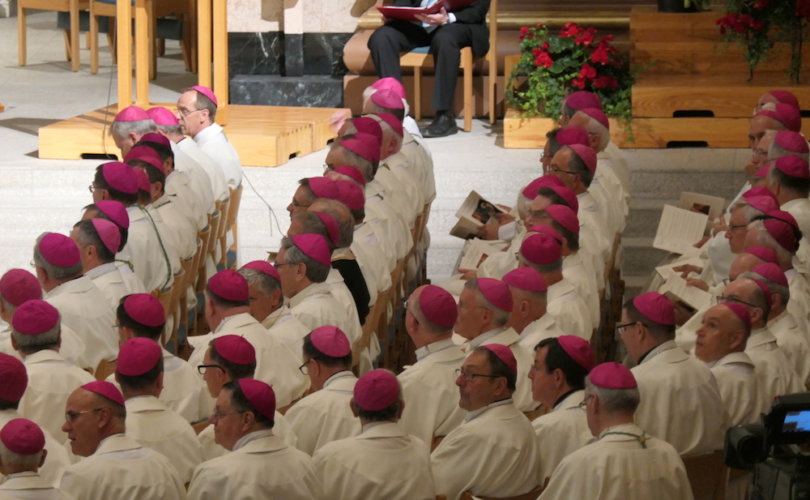INDIANAPOLIS, Indiana, June 16, 2017 (LifeSiteNews) – The U.S. Conference of Catholic Bishops (USCCB) wasn't interested in commenting on whether Amoris Laetitia means same-sex couples must be given Holy Communion if their “conscience” tells them it's OK. As LifeSiteNews asked the question at a Thursday press conference, the bishop of Burlington, Vermont, whispered something to the USCCB's director of public affairs, who then said questions should only relate to topics the bishops discussed that morning.
“OK, I – you know, the press conference, the panel has been put together pertaining to topics from today's news agenda, so I think we really need to stick to topics that … were visited this morning as the body of bishops were discussing them,” said Judy Keane, director of public affairs for the USCCB.
LifeSiteNews had asked:
There have been different interpretations of Amoris Laetitia in dioceses across the U.S, and I'm wondering if you think that ministers of Holy Communion must respect the consciences of communicants and that, therefore, homosexual couples should be able to receive Holy Communion – or, in fact, must be given Holy Communion – if they feel that they should do so in conscience?
Burlington Bishop Christopher Coyne can be seen whispering to Keane on the below video.
Earlier Thursday, Coyne argued against the permanent establishment of a bishops committee on religious liberty because the “optics” of doing so might suggest the Catholic bishops care more about religious freedom than immigration.
Chicago Cardinal Blase Cupich is one of the American prelates who is the most vocal about his belief that Amoris Laetitia allows Communion for the divorced and remarried. He also has said that people in same-sex unions can receive Communion and that pro-abortion politicians receiving Communion can be a good thing.
The numerous, differing interpretations of Amoris Laetitia have caused confusion because some bishops are saying the Church's perennial teaching remains in place while others say it has changed. The Church teaches that it's sacrilege for those in adultery to receive what it teaches is the literal body, blood, soul, and divinity of Jesus Christ.
Four cardinals have submitted a dubia, or formal request for clarification, to Pope Francis. They've asked if Amoris Laetitia is aligned with Catholic morality. He has yet to answer.

